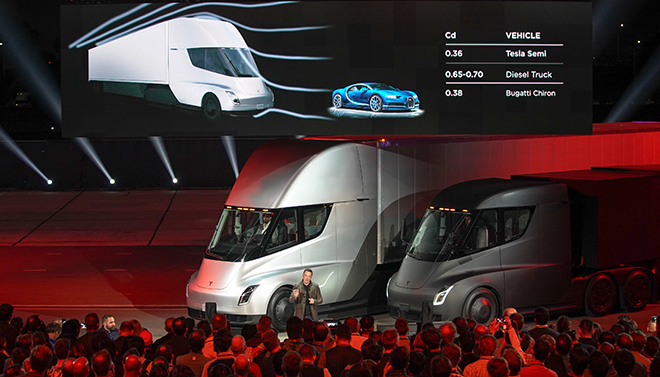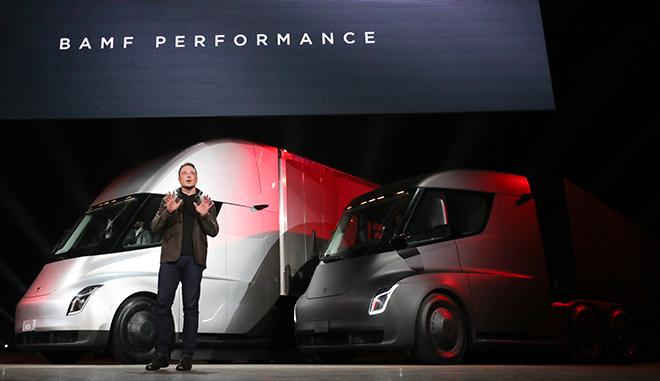This is big: big event, big truck, big battery…and big implications for the trucking industry, the global economy and the future of humans in the workforce.
The media (not only the EV press, but also outlets focusing on business and the trucking industry) has been in full speculation mode about the Tesla Semi for months, but it’s safe to say that few expected the electric tractor to be as cool as it was shown to be at Thursday’s reveal event (to say nothing of a little surprise Tesla was hiding in the trailer).
Master showman Elon Musk started the presentation by describing the new truck’s “BAMF performance” (what the acronym stands for is best left to the imagination). The Tesla Semi will accelerate from 0-60 in 5 seconds empty, and in 20 seconds with a full 80,000-pound load, more than twice as quickly as a legacy diesel truck. It can do 65 mph up a 5% grade – the best diesels can only reach 45 mph. Is that important? Absolutely. Semis may not compete on the drag strip, but time is money in the trucking business, and quicker acceleration could trim valuable minutes from trip times, especially in mountainous regions.
There are 4 motors – one on each of the rear wheels – and an independent front suspension. Driving range is 500 miles at maximum weight at highway speeds. Musk says the Tesla Semi will be able to charge to 400 miles of range in 30 minutes – that compares favorably to a diesel truck, which can take up to 15 minutes to refuel. A new network of Megachargers will be deployed along the highways.
 “Every truck we sell will have enhanced autopilot as standard,” said Musk. This includes such safety features as emergency braking and lane-keeping. Several other features contribute to what Musk called “a massive increase in safety.” The truck’s low center of gravity reduces the risk of rollover, and the 4 motors, with individually adjustable torque, are designed to make jackknifing, the dread of drivers, impossible.
“Every truck we sell will have enhanced autopilot as standard,” said Musk. This includes such safety features as emergency braking and lane-keeping. Several other features contribute to what Musk called “a massive increase in safety.” The truck’s low center of gravity reduces the risk of rollover, and the 4 motors, with individually adjustable torque, are designed to make jackknifing, the dread of drivers, impossible.
A few other little touches demonstrate that Tesla listened to experts in the trucking industry during the design process. “Thermonuclear-explosion-proof glass” may sound like an unnecessary frill (shades of Model X’s Bioweapon Defense Mode) until you learn that truck windshields tend to crack about once per year, resulting in huge expenses not only for replacing the glass, but for the downtime that results. The Tesla app offers remote diagnostics, predictive maintenance and location tracking.
What about reliability? Tesla will guarantee that the truck won’t break down for a million miles. Thanks to regenerative braking, the brake pads should last basically forever.
Cost savings? Musk promises that the Tesla Semi will cost 20% less per mile than a legacy truck – $1.26/mile versus $1.51/mile – or less. Tesla will guarantee electricity rates of $0.07 per kWh to Semi owners.
Production is scheduled to begin in 2019.

Customers are already starting to place orders. Bloomberg reports that retail giant Wal-Mart has preordered 5 trucks for the US and 10 for Canada. “We have a long history of testing new technology – including alternative-fuel trucks – and we are excited to be among the first to pilot this new heavy-duty electric vehicle,” said Wal-Mart spokesman Kory Lundberg.
Arkansas-based logistics company J.B. Hunt Transport Services has also reserved several Tesla Semis, which it plans to deploy on the West Coast. “We believe electric trucks will be most beneficial on local and dray routes, and we look forward to utilizing this new, sustainable technology,” said CEO John Roberts.
Canadian supermarket chain Loblaw has pre-ordered 25 units. “It’s part of our commitment to electrify our fleet,” spokeswoman Catherine Thomas told CTV News.




















































































